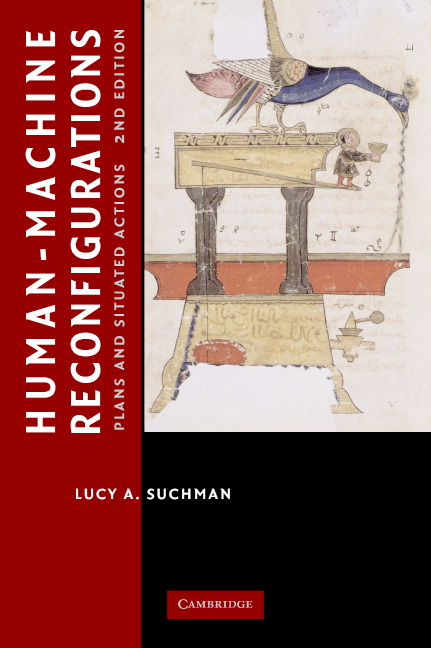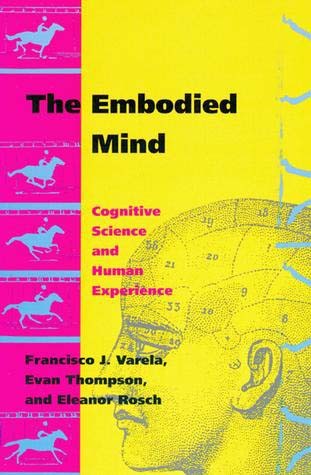Lucy Suchman: Human-Machine Reconfigurations: Plans and Situated Actions, 2nd ed (2007)
Filed under book | Tags: · anthropology, artificial intelligence, cognitive science, computing, ethnomethodology, human-computer interaction, interface, machine, robots, software, technology

“This 2007 book considers how agencies are currently figured at the human-machine interface, and how they might be imaginatively and materially reconfigured. Contrary to the apparent enlivening of objects promised by the sciences of the artificial, the author proposes that the rhetorics and practices of those sciences work to obscure the performative nature of both persons and things. The question then shifts from debates over the status of human-like machines, to that of how humans and machines are enacted as similar or different in practice, and with what theoretical, practical and political consequences. Drawing on scholarship across the social sciences, humanities and computing, the author argues for research aimed at tracing the differences within specific sociomaterial arrangements without resorting to essentialist divides. This requires expanding our unit of analysis, while recognizing the inevitable cuts or boundaries through which technological systems are constituted.”
Publisher Cambridge University Press, 2007
Learning in Doing: Social, Cognitive and Computational Perspectives series
ISBN 052167588X, 9780521675888
314 pages
Matthias Scheutz (ed.): Computationalism: New Directions (2002)
Filed under book | Tags: · artificial intelligence, cognitive science, computing, semantics, turing machine

“Classical computationalism—-the view that mental states are computational states—-has come under attack in recent years. Critics claim that in defining computation solely in abstract, syntactic terms, computationalism neglects the real-time, embodied, real-world constraints with which cognitive systems must cope. Instead of abandoning computationalism altogether, however, some researchers are reconsidering it, recognizing that real-world computers, like minds, must deal with issues of embodiment, interaction, physical implementation, and semantics.
This book lays the foundation for a successor notion of computationalism. It covers a broad intellectual range, discussing historic developments of the notions of computation and mechanism in the computationalist model, the role of Turing machines and computational practice in artificial intelligence research, different views of computation and their role in the computational theory of mind, the nature of intentionality, and the origin of language.”
Publisher MIT Press, 2002
ISBN 0262194783, 9780262194785
209 pages
Francisco Varela, Evan T. Thompson, Eleanor Rosch: The Embodied Mind: Cognitive Science and Human Experience (1991)
Filed under book | Tags: · body, cognition, cognitive science, connectionism, mind, neuroscience, perception, phenomenology, philosophy, psychoanalysis, self

“Although the scientific study of the mind has developed rapidly in recent years, it has devoted little attention to human cognition understood as everyday lived experience. The Embodied Mind corrects this imbalance within cognitive science by providing a deep and sophisticated treatment of the spontaneous and reflective dimensions of human experience. Varela, Thompson, and Rosch argue that it is only by having a sense of common ground, between mind in science and mind in experience that our understanding of cognition can be more complete. To create this common ground they develop a dialogue between cognitive science and Buddhist meditative psychology and situate this dialogue in relation to other traditions, such as phenomenology and psychoanalysis.
The dialogue proceeds in five parts. The first introduces the two partners and explains how the dialogue will develop. The second presents the computational model of mind that gave rise to cognitive science in its classical form. The authors show how this model implies that the self is fundamentally fragmented and introduce the complementary Buddhist concept of a nonunified, decentralized self. The third shows how cognitive science and Buddhist psychology provide the resources for understanding how the phenomena usually attributed to a self could arise without an actual self. The fourth presents the authors’ own view of cognition as embodied action and discusses the relevance of this view for cognitive science and evolutionary theory. The fifth considers the philosophical and experiential implications of the view that cognition has no foundation or ground beyond its history of embodiment and explores these implications in relation to contemporary Western critiques of objectivism and the nonfoundationalist tradition of Buddhist philosophy.”
Publisher MIT Press, 1991
ISBN 0262720213, 9780262720212
328 pages
PDF (updated on 2020-4-17)
Comments (3)
